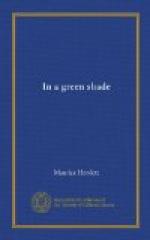“Pour la rarete du fait et la bizarrerie des hommes, I must put down what I dare tell nobody—I should be so much ashamed of it were it not so ridiculous. At this present April, 1812, in my fifty-first year, I am courted, follow’d, flatter’d, and made love to en toutes les formes, by four men—two of them reckoned sensible, and one of the two whom I have known half my life—Lord Holland, Ward, young M——n, and little M——y. Sir J.C. wanted to marry me when I was fifteen; so from that time to this—36 years, a pretty long life—I have heard or spoke that language; and for 17 years of it lov’d almost to Idolatry the only man from whom I could have wish’d to hear it, the man who has probably lov’d me least of all those who have profess’d to do so—tho’ once I thought otherwise.”
Arrant sentimentalist, born and trained flirt, as this confession shows her to have been, it also shows that she lived to rue it. She rued more than that, for she was the mother of Lady Caroline Lamb; and if anything more need be said of her misfortunes, let it be added that she was sister to Georgiana of Devonshire. Nevertheless, it is impossible to read her letters with her wooden young lord without seeing that she had a good heart, if a very weak head. She loved much; and for those whom she loved—her sister, her children, Granville Gower—she was ready to dare all things, and fail in most. Of her husband there is nothing to tell, for she hardly names him, except to say that he has the gout. Not much is known of him, and nothing but good. Horace Walpole wrote of his marriage in 1780: “I know nothing to the prejudice of the young lady; but I should not have selected for so gentle and very amiable a man a sister of the empress of fashion, nor a daughter of the Goddess of Wisdom.” The goddess of wisdom was her formidable and trenchant mother, Lady Spencer.
But I don’t intend to follow the vain stages of her sentimental pilgrimage in pursuit of Lord Granville Gower’s heart, vain because apparently the young man had not such an organ at her disposal. It was not, perhaps, for nothing that they exchanged reflections upon Les Liaisons Dangereuses. A new Choderlos de Laclos would get a new sentimental novel out of the Granville Gower correspondence; or it may be taken as it stands for a recovered Richardson, quite as long as Sir Charles Grandison and much more amusing—for the poor lady is often witty. The affair dragged on, with much scandal, much whispering about it and about, until 1809, when the hero of it married Lady Harriet Cavendish, his mistress’s niece. J.W. Ward, one of her lovers, according to her, sharply sums it up in a letter to Mrs. Dugald Stewart: “Lord Granville Leveson is going to marry Lady Harriet Cavendish. Lady Bessborough resigns, I presume, in favour of her niece. I have not heard what are supposed to be the secret articles of the treaty, but it must be a curious document.” It was in 1812, as I have said, that she wrote out the pathetic confession of what we must suppose to have been the truth.




